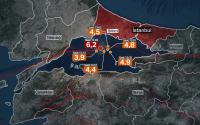A top British environmentalist said on Friday the developing world needed to spend at least $40 billion more every year to fight climate change.
Last year was the warmest on record across the globe and it was unusually hot in the Arctic, U.S. space agency NASA said last month. Five of the hottest years since modern record-keeping began in the 1890s occurred in the past decade.
"If the developing world is to have extra resources necessary to modify their investments to make them carbon clean or reduce it significantly, they need extra finance of over $40 billion each year," Sir Nicholas Stern, adviser to the British government on climate change, told Reuters.
Scientists say the earth's atmosphere is warming as ever-greater amounts of carbon dioxide are pumped into the air by the burning of fossil fuels to feed coal-fired power plants, smoke-stack industries and transport.
Carbon dioxide levels are now at their highest levels than at any time in the past 650,000 years, Antarctic ice core studies show and concentrations of methane, another powerful greenhouse gas, are rising as well because of agriculture, melting Arctic permafrost and destruction of peat bogs.
Scientists say global warming threatens to create greater extremes of droughts and floods, more intense storms, rising seas and melting glaciers and ice caps.
Stern, who was speaking on the sidelines of a conference of world environmentalists, scientists and policymakers to discuss sustainable development, said the $40 billion was less than developing governments are already spending on energy.
Major developing nations such as India, China, Mexico and Indonesia, rely heavily on fossil fuels to power their rapidly growing economies, while Brazil is losing large areas of rainforest each year that can soak up carbon dioxide.
"If you look at it in relation to the energy and electricity bills which the developing world is already running, it would be far cheaper if they invest in cleaner technologies," he said.
"The world as a whole would benefit and save resources."
During a conference session on climate change, speakers said the world needed to adapt to harsher weather by developing new crops and infrastructure, at the same time making greater efforts to cut emissions of greenhouse gases.
The International Energy Agency says if all the world's governments stick with current policies, global energy needs and carbon emissions will be 50 percent higher in 2030 than 2005.
"Adaptation is a priority now," said Neil Leary, a senior scientist at U.S.-based START, a non-governmental green group.
The Delhi meeting comes ahead of an major United Nations conference on biodiversity to be held in Brazil in March, which aims to reduce the current rate of loss of species, save forests from loggers and stop deserts advancing.






